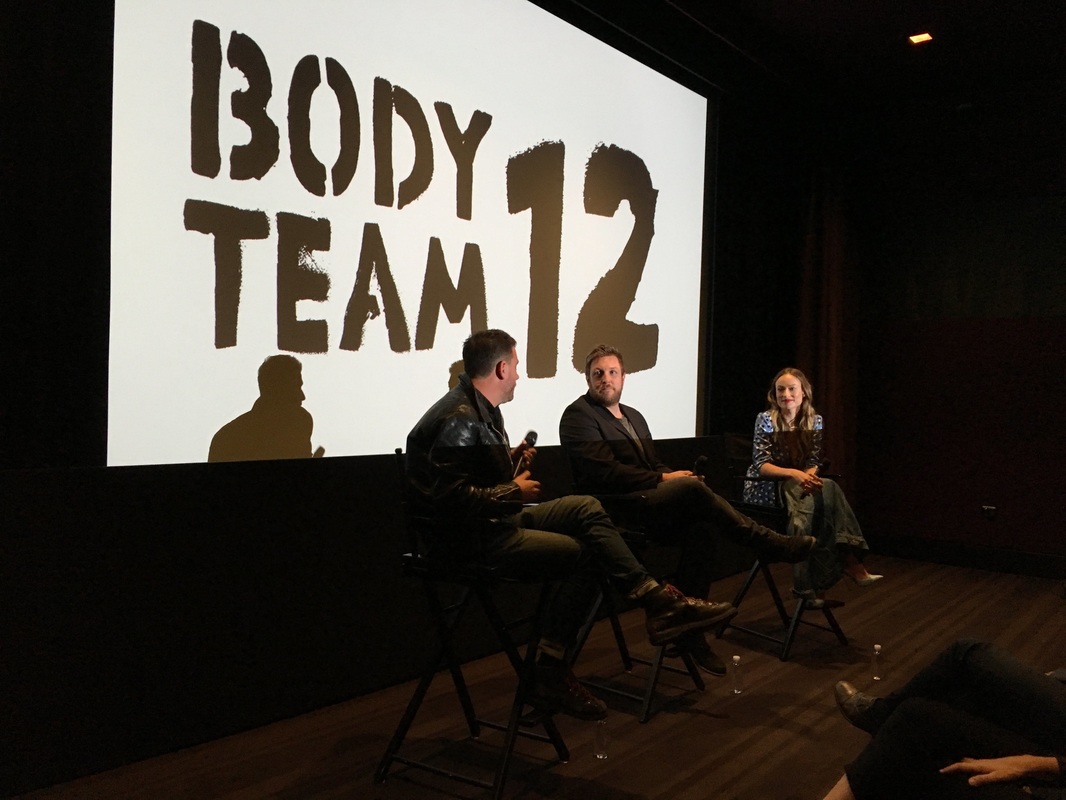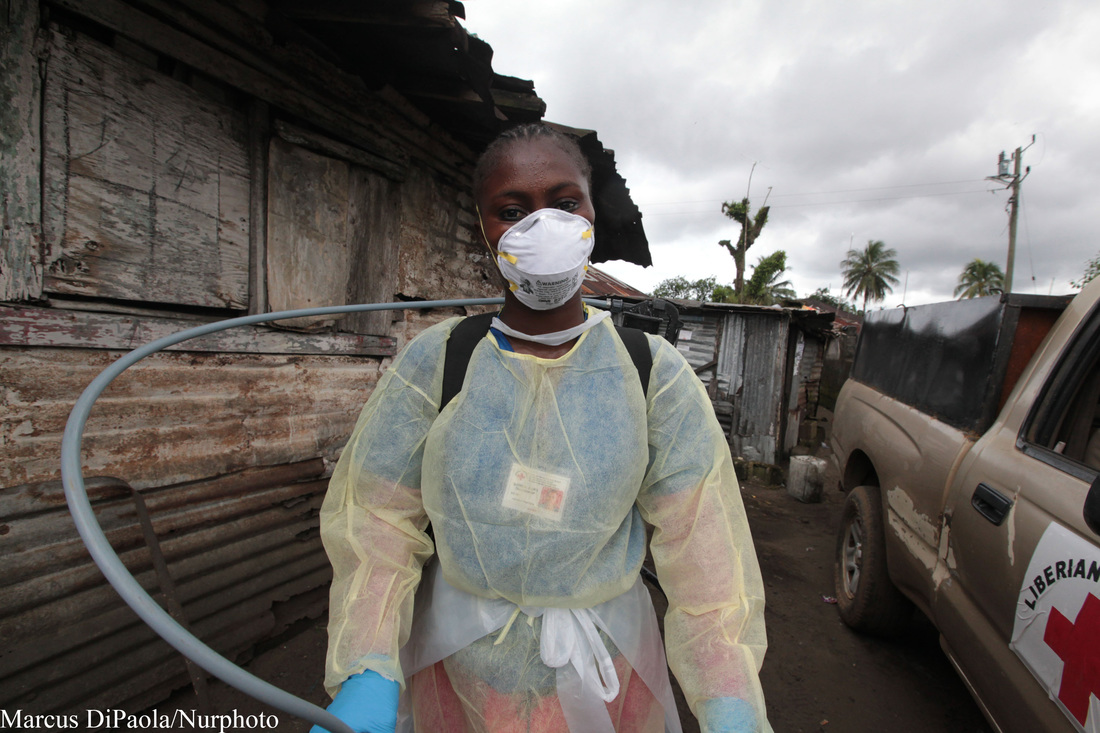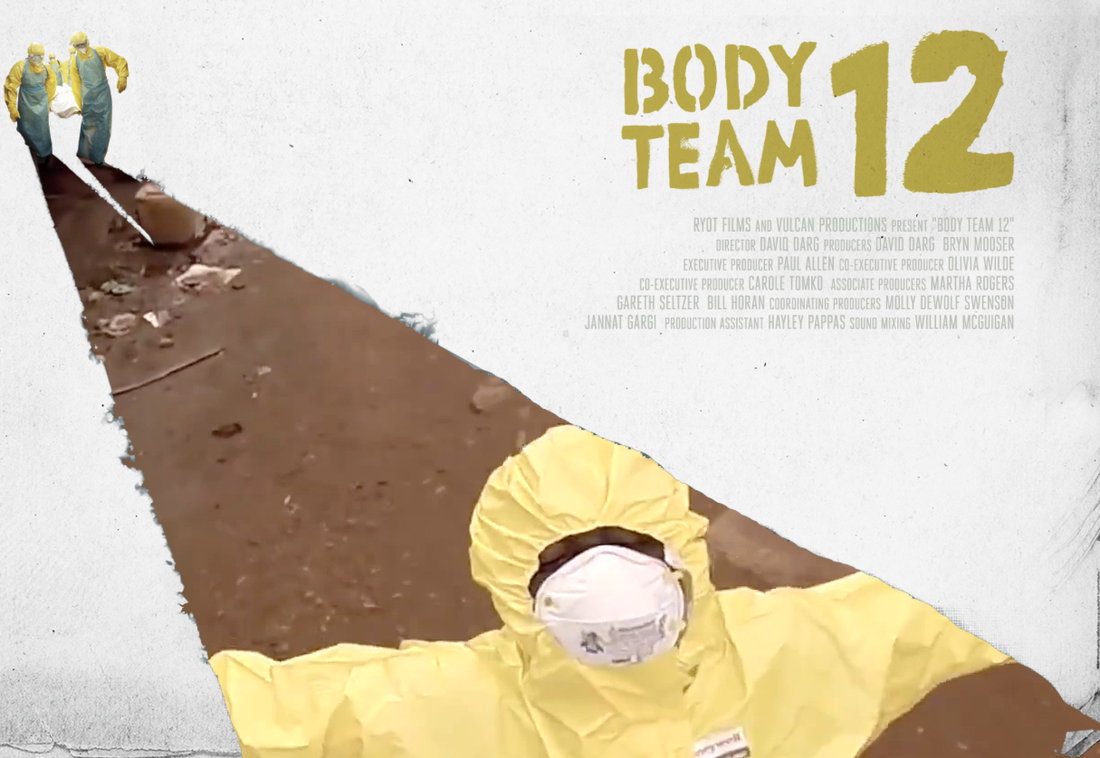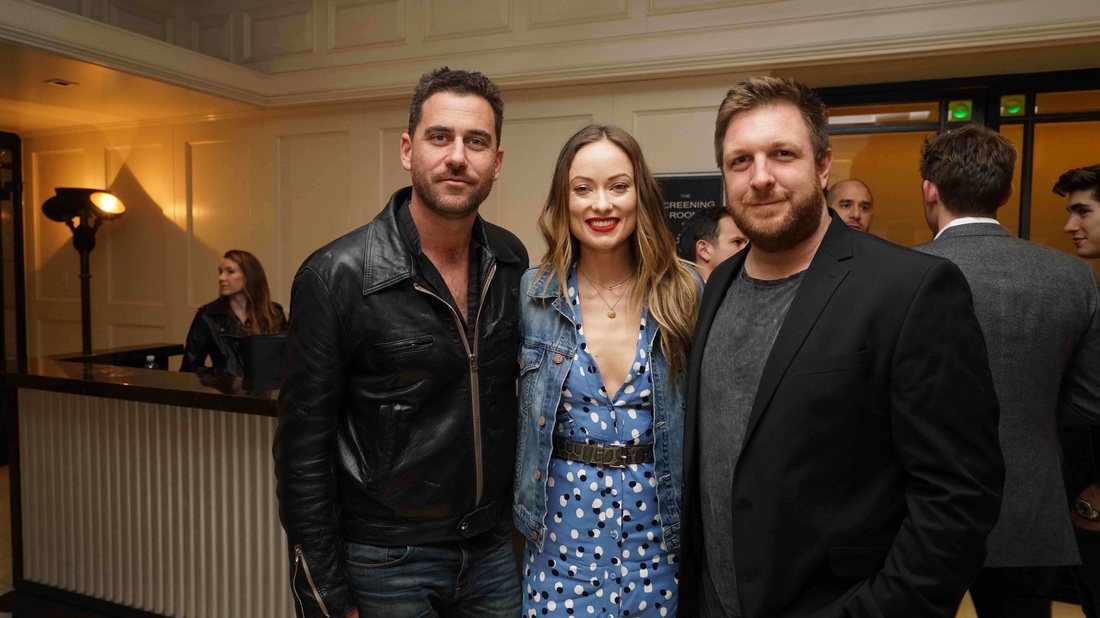|
Actress executive-produced Body Team 12, on courageous Liberians who battled Ebola
With just days to go before Oscar voting ends, actress Olivia Wilde turned out in support of Body Team 12, a short documentary she executive-produced that's in contention for an Academy Award.
Wilde attended a screening of the film at the London West Hollywood and moderated a Q&A afterwards with director David Darg and producer Bryn Mooser. I call David the Leonardo DiCaprio of documentary directors.
The event was attended by a number of luminaries including Oscar-winning actress Marcia Gay Harden, Survivor host Jeff Probst and Microsoft co-founder Paul Allen, whose Vulcan Productions produced Body Team 12.
The film, which earned Best Documentary Short at the Tribeca Film Festival and an IDA Award nomination, follows Garmai Sumo, a Liberian woman who risked her life to join a 'body team' during the recent Ebola outbreak in her country. The teams were charged with the excruciating but essential task of disposing of the remains of Ebola victims to curb the spread of the disease.
"It was incredibly inspiring to me to see anyone able to undergo what she was undergoing. Not only was she exposed to the potential risk of Ebola on a daily basis, the physical toll of what she was doing was immense, but the mental toll — extremely immense," Darg said. "Not only was she ostracized by her friends and family, her son was ostracized because of the stigma of Ebola. So everything surrounding her life at the time was tough — the risk of infection and just the stigma. It was incredible to me to see any human endure that level of anguish and still come out the other side."
Often the distraught families of Ebola victims were hostile to the body teams, Darg said.
"She was the one having to calm down these very angry, very aggressive family members and always eventually negotiated the release of the body." "I just thought this story is about Garmai as a feminist heroine. I love the way— she describes it herself — the value of a woman and the nurturing nature of a woman in that position and why she found that to be so necessary. And I was just completely blown away by that," Wilde said. "Her willingness to potentially sacrifice her life… The bravery she had to take on that role while also being a mother… It seems like a risk of a different type for a woman. That’s why to me Garmai is one of the greatest heroines I’ve ever read about or seen." Darg and Mooser said they've been keeping Sumo updated throughout the progress of awards season. "She was there on the phone when we got the [Oscar] nomination and was screaming down the other end which was cool. We’re all friends on Facebook and so she’s constantly following the updates, so she’s excited about it and it’s really great for us to share with her the fact that her story is being shared around the world," Darg said. "We’re going to relay tonight to her— she’ll be excited to know her film was here tonight in LA."
Darg put his own life on the line to make the film, shooting footage while outfitted in a hazmat suit.
"My wife didn’t know what I was up to," Darg said. "I promised her I wasn’t going near any dead bodies and it wasn’t until she saw the first cut of the film, she was pissed. She wouldn’t talk to me for like a day." Mooser chimed in, "The nomination is helping with that." "Two of the trips I took [to Liberia] were right at the height of the outbreak," Darg elaborated. "And the CDC had implemented a monitoring protocol, so anyone returning from the region had to check in with the CDC twice a day and I had to monitor my symptoms, and to take my temperature, talk to a nurse. And she had this crazy checklist of symptoms she had to ask everyday which included, 'Is there blood coming out of your eyes?' Twenty-one days each time [of quarantine]. I was at home. It wasn’t anything as dramatic as a bio-container, but I was at home, not able to go out in public. But it was great because I’m notorious for being on the move all the time. And Bryn had me as a captive." "It was the best editing sessions that we ever did on any film because he was in one place," Mooser said. "We were editing it here so we were both in quarantine."
Darg and Mooser co-founded RYOT, which began as a news site and has since expanded its mission to not only cover crisis situations around the globe -- like the earthquake in Haiti and the refugee crisis in Europe -- but to spur grass roots action. Danger is inherent in what they cover.
"We’ve been in a lot of crazy situations, I don’t think any as sinister as Ebola because it’s an invisible threat. A lot of what we’re used to is being in is crisis zones and conflict zones where you kind of have at least some idea if you’re under any sort of imminent threat. So it was very sinister about Ebola, just not knowing if I could be next," Darg said. "People were literally dropping dead around us all the time. I would get back after a day shooting and be fatigued and have a headache and those are the initial symptoms of Ebola, so I got a small glimmer of the anxiety that these body teams were feeling on a daily basis. And it was brutal." "This is why I call David the Leonardo DiCaprio of documentary directors," Wilde said, an apparent reference to the mauling the actor took in The Revenant. On January 14th of this year, the World Health Organization reported that West Africa was finally free of Ebola, ending a two-year outbreak that cost thousands of lives. Paul Allen committed $100 million to fight the outbreak, an effort that extended to funding production of Body Team 12. Sometimes it takes a film like BT12 to make a catastrophe tangible to people far from the crisis zone. "Academy voters nominating this film, which is obviously a huge honor, allows even more people to see it. So it’s amazing to see how something that is set up within our industry can have such a huge impact on a global level," Wilde said. "It’s kind of extraordinary."
|
AuthorMatthew Carey is a documentary filmmaker and journalist. His work has appeared on Deadline.com, CNN, CNN.com, TheWrap.com, NBCNews.com and in Documentary magazine. |
- Home
- News
- Videos
-
Galleries
- 2019 Tribeca Film Festival
- Full Frame Documentary Film Festival
- 2019 SXSW Film Festival
- SXSW 2018 Gallery
- 2019 Sundance Film Festival
- Outfest 2018 Photo Gallery
- Outfest 2017
- Sundance 2018 Photos
- 2017 LA Film Festival
- 2017 Cannes Film Festival
- Tribeca Film Festival 2017
- SXSW 2017 Gallery
- 2017 Berlin Film Festival
- Sundance 2017 Gallery
- 2016 Los Angeles Film Festival
- Cannes Film Festival 2016
- SXSW 2016 Gallery
- Berlinale 2016 Gallery
- Sundance 2016 Gallery
- Filmmaker Gallery
- About
- Contact
Proudly powered by Weebly
- Home
- News
- Videos
-
Galleries
- 2019 Tribeca Film Festival
- Full Frame Documentary Film Festival
- 2019 SXSW Film Festival
- SXSW 2018 Gallery
- 2019 Sundance Film Festival
- Outfest 2018 Photo Gallery
- Outfest 2017
- Sundance 2018 Photos
- 2017 LA Film Festival
- 2017 Cannes Film Festival
- Tribeca Film Festival 2017
- SXSW 2017 Gallery
- 2017 Berlin Film Festival
- Sundance 2017 Gallery
- 2016 Los Angeles Film Festival
- Cannes Film Festival 2016
- SXSW 2016 Gallery
- Berlinale 2016 Gallery
- Sundance 2016 Gallery
- Filmmaker Gallery
- About
- Contact





 RSS Feed
RSS Feed